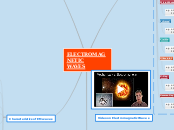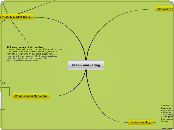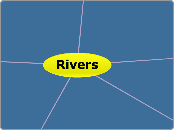Video on Electromagnetic Waves
-Decay of radioactive
nuclei, fission and fusion
of atomic nuclei.
X-Ray machine
-Sudden retardation
of high energy electrons.
-Excitation of atoms
and vacuum spark.
Sun
-Excitation of atoms,
spark and arc flame.
TV remote
-Excitation of atoms
and molecules.
Wifi
Microwave oven
-Oscillating currents
in special vacuum tubes.
Source(s)
Radios
TV
-Oscillating circuits
Shorter Wave Length
Higher Frequency
Higher Energy
Longer Wave Length
Lower Frequency
Lower Energy
ELECTROMAGNETIC
WAVES
Characteristics of EM waves
Carries no electrical charge
Obeys law of reflection and refraction
When travelling from one medium to another:
1)Speed Varies
2) Wavelength Varies
3) Frequency does not change
For example: when light travels from vacuum to water, its speed decreases from 3.0 x 10^8 m/s to 2.2 x 10^8 m/s. It's wavelength also decreases, while its frequency remains unchanged.
The wave speed equation : v = λ f
is applicable to all electromagnetic waves.
All travel at 3.0 x 10^8 m/s in vacuum
Transfers energy from one place to another
For example; electromagnetic waves from the Sun transport thermal and light energy through space(i.e. vacuum) to Earth.
Able to travel through vacuum
And do not require a medium to travel from one point to another
Electromagnetic waves are transverse waves. They comprise electric and magnetic fields that oscillate at 90 degrees to each other.
Dangers of Electromagnetic Waves
- Gamma Rays cause cell
damage and can cause a variety of
cancers.
- They cause mutations in
growing tissues, so unborn
babies are especially vulnerable.
- X-Rays can cause cell
damage and cancers.
- Large doses of UV can damage
the retina.
- Large doses of UV can cause
sunburn and even skin cancer.
- Too much light can damage
the retina in your eye. Although
the damage can heal, if it's too
bad it'll be permanent.
- The danger to people from
too much Infra-Red is overheating.
- Prolonged exposure to significant
levels of microwaves is known to
cause "cataracts" in your eyes.
- Generally not harmful
- However, large doses of
radio waves are believed to cause cancer,
leukemia and other disorders.
Types of Electromagnetic Waves & Applications
Gamma Rays
- Cancer treatment
(Radiotherapy)
- Tracers used by
doctors to see body
processes working
rather than seeing
still images
- Industrial tracers
- Sterilize food
(Irradiated food)
Pass through most
materials, difficult to
stop.
-Extremely high
frequency waves
X- Rays
- X-Ray to see inside people
to diagnose injuries like bone
fractures.
- Airport Security checks to see
inside your luggages.
Dangerous as it
can cause cell
damage and
cancers.
High Energy
- Artificial Tanning
- Detecting forged bank notes
- Hardening dental filling
- Kill microbes and sterilize surgical equipment
- Used in Vitamin D deficiency treatment
- Given off by the Sun
- Attracts insects
Visible Light
-Lasers
-Laser Printers
-Light Bulbs
-DVD and CD Players
use lasers to read patterns
and translate it into sound
and video data.
- Only part of the
Electromagnetic spectrum
that is detectable by the
human eyes
- Remote Controls
for TVs
- Short-Range
communications
-Security systems
(Burglar alarm
systems)
-Thermal Imaging
- Given off by hot
objects
Microwaves
- Microwave Ovens to
cook/heat up food.
- WiFi internet
-Speed Cameras
- Radars
Examples of Uses
- Used to transmit television
and radio programmes.
- Mobile Radio Communication
- Broadcasting
Characteristics
- Transverse Wave
- Longest Wavelength
ELECTROMAGNETIC SPECTRUM
Gamma Ray
e.g. λ: 10^-12m
f: 3 x 10^20 Hz
X- Ray
e.g. λ: 10^-10m
f: 3 x 10^18 Hz
Ultraviolet
e.g. λ: 10^-8m
f: 3 x 10^16 Hz
Visible
e.g. λ: 10^-6m
f: 5 x 10^14 Hz
Infrared
e.g. λ: 10^-5m
f: 10^12 Hz
Micro Waves
e.g. λ: 10^-2m
f: 10^8 Hz
Radio Waves
e.g. λ: 10^3m
f: 10^4 Hz









